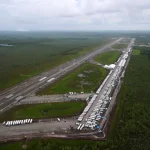
A U.S.-led coalition to deter the Houthi rebels based in Yemen from continuing to strike commercial vessels and largely shut down trade through a crucial waterway has left experts perplexed and doubtful the coalition will succeed.
The Iran-backed rebel group that controls parts of Yemen launched so many missile attacks against commercial shipping vessels in the Red Sea — and sent U.S. warships scrambling to their rescue — that major companies ordered their ships to stop transit through one of the world’s most important shipping lanes. Aimed at safeguarding maritime security, Operation Prosperity Guardian announced on Monday merely deploys a smokescreen over the Biden administration’s unwillingness to address the roots of the threat, experts told the Daily Caller News Foundation.
“I think it will be irrelevant — it won’t change the realities in the region nor will it stop future attacks. It may better coordinate limited humanitarian response to ships in distress after an attack or during an attempted hijacking,” Brent Sadler, the senior research fellow for naval warfare at the Heritage Foundation, told the DCNF.
Secretary of Defense Lloyd Austin met with task force participants and representatives from more than two dozen additional countries while on a trip to the Middle East on Tuesday to highlight the threat posed, according to a Pentagon readout.
“It’s a defensive coalition meant to reassure global shipping and mariners that the international community is there to help with safe passage,” Pentagon press secretary Brig. Gen. Pat Ryder said Thursday, referring to Operation Prosperity Guardian. But, he added, forces assigned to the plan will continue to assist commercial vessels as they had been.
Trending:
As of the meeting, the Houthis had conducted more than 100 drone and missile attacks against ten commercial ships connected to 35 different nations, the readout stated. The Houthis still hold captive the crew of the Galaxy Leader hijacked on Nov. 19, which remains in port in Yemen.
Since the first attack more than a month ago, U.S. destroyers have rendered assistance to shipping vessels struck with drones and missiles, and shot down at least 38 one-way attack drones assessed as threats to the American warships. The Pentagon has not confirmed that any of the suicide drones directly targeted the destroyers initially sent to the region to ensure stability as the Israel-Hamas conflict threatened to cascade.
But so far, Operation Prosperity Guardian is too little, too late, experts told the DCNF. “The Houthis will continue these attacks on international shipping if there are no consequences. More naval capacity can help better protect commercial vessels and defeat Houthi attacks. But even the best defenses will eventually fail,” Bradley Bowman, senior director of the Center on Military and Political Power at the Foundation for Defense of Democracies, wrote.
Details about Operation Prosperity Guardian remain scant. It’s an expansion of an existing U.S. Navy-led group, Task Force 153, which is just one of many similar task forces intended to counter various threats in the area and based out of the Navy’s 5th Fleet headquarters in Manama, Bahrain. It will provide a hedge of defense for ships in the Red Sea, Gulf of Aden and Bab el-Mandeb Strait but stop short of offering direct escort to vessels, The Associated Press reported.
Will the Biden administration be able to stop the Houthi’s shipping lane attacks?
Yes: 0% (0 Votes)
No: 100% (5 Votes)
The task force “seems just a formalizing of what has already occurred amongst allies there now and the preexisting counter-piracy naval presence,” Sadler said. The Pentagon provided “no clear articulation of what this new operation will actually do, aside from respond to attacks, which doesn’t really address the problem — Houthi attacks.”
Three U.S. Arleigh Burke-class guided-missile destroyers, The USS Carney, the USS Stethem and the USS Mason, have been patrolling the waters daily. The USS Dwight D. Eisenhower aircraft carrier arrived in the Bab el-Mandeb from the Arabian Gulf on Monday, satellite imagery shows.
Maintaining the status quo will be difficult, as the U.S. Navy has no way to reload vertical launch cells for the Standard Missile-2 while at sea, Sadler explained. That’s just one of the possible weapons the Navy has used to destroy incoming drones, although the Pentagon has declined to provide specifics.
Open members of the coalition include the United Kingdom, Bahrain, Canada, France, Italy, Netherlands, Norway, Seychelles and Spain.
The United Kingdom devoted the Type 45 destroyer HMS Diamond to the effort and France pledged the frigate Languedoc, both of which were already operating in the region and notched kills on Houthi drones. Italy will send the multi-mission frigate Virginio Fasan to the Red Sea, according to Defense News.
Canada has devoted two planners and one intelligence officer on top of the five already serving the combined maritime forces who will arrive as early as the week of Dec. 25, according to a news release.
Norway pledged ten additional staff officers, Defense News reported. The Netherlands said it would send two staff officers and is considering deploying a ship.
European Union chief Josep Borrell said member states agreed in an emergency meeting to contribute to the effort in a Wednesday statement. “We will intensify our information sharing and increase our presence with additional naval assets,” he said. More than 20 countries have volunteered to participate, Ryder said Thursday.
Some Arab countries did not want to be publicly named, Politico reported, citing a senior administration official. One of those could be Saudi Arabia, whose notable absence from the coalition likely stems from a reluctance to entangle itself further in conflict with the Houthis and jeopardize an ongoing effort to reach a ceasefire with the rebel group they have been at war with since 2014, according to Reuters.
“This reluctance is telling as it is a reflection of the countervailing pressures these countries face whereby their security and economic interests are threatened by these Houthi attacks but public and high-profile participation may also create new risks,” Michael Hanna, U.S. program director for the International Crisis Group, told the DCNF.
Early on, the Pentagon emphasized that the problem was not exclusive to the U.S. Many large tankers and cargo ships have left the Red Sea and have rerouted around the Cape of Good Hope, while others appeared to stand by awaiting escort. As of Wednesday, shipping company Kuehne and Nagel reported more than 100 large ships had already turned around, prepared for the long journey around Africa’s southernmost point, The Guardian reported.
Between 10% and 15% of global trade flows through the Red Sea, including about 10% of seaborne crude oil and liquid natural gas, according to the U.S. Energy Information Administration.
The Houthis “really need to ask themselves if they’ve bitten off more than they can chew, when it comes to taking on the entire international community and negatively impacting billions and billions, billions of dollars in global trade, economic prosperity and international law,” Ryder said. Austin said the problem would only grow worse if the international community did not step in, according to the Pentagon readout.
The best way to stop further attacks is by the U.S. carrying out targeted attacks on Houthi launch sites, experts said. Only that would scare the Houthis into ceasing attacks and give shipping companies confidence to resume transit through the Red sea.
“If we see more go in then that it’s being effective,” Victorai Coates, a former deputy national security adviser in the Trump administration who now heads Heritage’s foreign policy house, told the DCNF, referring to Operation Prosperity Guardian.
“You have to both have the assets and then show that you’re willing to use them. And my guess is, if history be our guide, that the Houthis would back down at that point, but until that happens, they’re just going to keep pressing forward,” she added.
The Houthis said they will not be deterred and threatened to retaliate if the U.S. carried out direct strikes on Yemen. “Our war is a moral war, and therefore, no matter how many alliances America mobilizes, our military operations will not stop,” Mohammed Albukhaiti, who sits on the group’s ruling council, told The Washington Post on Dec. 19.
“We will not stand idly by if the Americans are tempted to escalate further and commit foolishness by targeting our country or waging war against it,” Houthi chief Abdel-Malek al-Houthi said on Wednesday, Reuters reported. “Any American targeting of our country will be targeted by us, and we will make American battleships, interests, and navigation a target for our missiles, drones, and military operations.”
Initially the group said it would attack commercial vessels linked to Israel or destined to deliver cargo at Israel’s southern port, according to Reuters, but their targets appear to have broadened.
Hanna thought airstrikes were unlikely to be effective and would be unlikely to receive broad support from the U.S. and its partners.
MAP OF THE DAY: The number of ships that have diverted from the Red Sea and instead taken the 10/14-day longer route around Africa has risen to >100.
The map shows **container ships** declaring European ports as destination, with one only left in the Red Sea | #Yemen #RedSea pic.twitter.com/VBJCMvHUDU
— Javier Blas (@JavierBlas) December 20, 2023
However, most experts agreed the administration’s slowness in mounting a formal response to the Houthis betrays its willful blindness to the motivations of regional actors, experts said.
The Israel-Hamas war “has provided the Houthis with a useful pretext for power projection in new and novel ways,” Hanna told the DCNF. “They are demonstrating a much greater appetite for risk than other Iranian proxies and partners. So deterring them is a difficult task, particularly as the US continues to try to avoid major regional escalation alongside the war in Gaza,” Hanna said.
Operation Prosperity Guardian is a good first step, Bowman said. But, the Houthis can still count on weapons and financial support from Iran, which only increases their confidence in launching future attacks.
“Thus the U.S. and its partners may have to do more than put additional warships on defensive patrol. We must be prepared to go on offense: to carry out offensive strikes against targets ashore, perhaps using Tomahawk missiles and attack aircraft from the carrier USS Eisenhower,” he wrote.
Biden appeared to believe the Houthis and their benefactors in Iran could be reasoned with, and because of that “they wouldn’t do something so utterly unreasonable as attack shipping through the Red Sea, which is good for no one,” Coates said.
All content created by the Daily Caller News Foundation, an independent and nonpartisan newswire service, is available without charge to any legitimate news publisher that can provide a large audience. All republished articles must include our logo, our reporter’s byline and their DCNF affiliation. For any questions about our guidelines or partnering with us, please contact [email protected].








